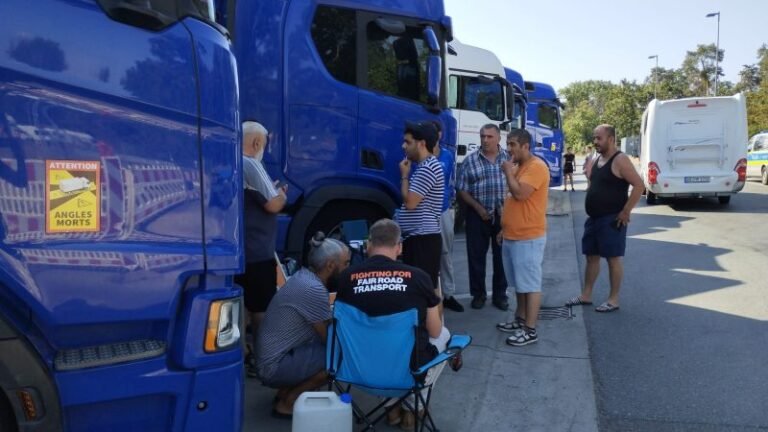Foreign truck drivers who transport goods across Europe have begun a hunger strike in Germany as part of a weeks-long work stoppage, calling it their “last hope” to draw attention to the exploitation they say they suffer.
It was the latest stage in a move union officials described as “unprecedented,” with about 80 drivers setting up camp using their cars at a highway service station.
Some of them, believing that Polish employers would not respond to their growing desperation amid the 10-week strike, stopped eating last week.
Truck drivers – mostly from Uzbekistan and Georgia, with a few also from Tajikistan, Ukraine and Turkey – began transporting food again over the weekend after several days, but the same blockage continues.
The drivers claim they are not paid regularly – an average of around €80 a day – and are paid exorbitant amounts to accept the job in the first place. They also say they face inhumane conditions such as having to work extremely long hours.
“I just want to get the money I earned,” Roman Gogabidze, a Georgian truck driver lying under a blanket in the back of his truck, told AFP at a service station in Grafenhausen outside Frankfurt.
He was among those who joined the hunger strike, saying it was “our last hope,” adding: “There is nothing left to be done.”
Another driver, Fayzulu Nematov, said he was desperate to get the money he was owed so he could send it to support his wife, children and elderly mother back home in Uzbekistan.
“I’m the only one making money,” he said.
across europe
Drivers work for several Polish transport companies owned by Mazur Group.
But the group insisted in a statement that all salaries were paid “in a timely manner” and that they had undergone a recent inspection that found no irregularities in payments.
The company also sought to distance itself from the issue of fees paid for visas or job recommendations, insisting that drivers should discuss this with the “intermediary” companies they used to hire them.
They rejected the suggestion that drivers be forced to work long hours, saying they “cannot dictate to drivers daily working hours or maximum days off,” adding that this was the truck drivers’ choice.
Drivers transport a wide range of goods for major European companies, operating in countries such as Germany, France, Italy, Austria, the Netherlands and Switzerland.
Despite receiving small, regular allowances for food, truck drivers said they could go months without pay, and when it does come, it is usually less than it should be.
They are demanding 500,000 euros, which they say are unpaid wages.
Edwin Atema, head of the Road Transport Due Diligence Foundation, which monitors and combats labour standards violations in Europe, said they chose to stage their strike in Germany, rather than Poland, because they felt safer doing their work there.
They also successfully struck at the same location earlier this year, albeit for a shorter period.
“fully exploited”
Such a move is “unprecedented” in the European trucking industry, Atema added.
“For the drivers, it is very difficult mentally and physically. They come here because they are being completely exploited, they are not getting paid, they have problems at home, they cannot feed their children.”
The case highlights the complex supply chains that move goods quickly between wealthy European markets, which critics say leave those who actually do the work vulnerable.
“By hiding behind other companies that transport their goods, the well-known companies are trying to deny their responsibility for this,” added Atema, who is also a Dutch union official.
“The root cause is that this issue is not a priority. As long as the goods are being transported, no one cares how the drivers are being exploited,” he said.
Drivers and companies have traded complaints against each other, and prosecutors have confirmed they are looking into claims from both sides.
But drivers insist they are being treated badly – and their message is clear.
“Pay us our money, we need to send it to our families,” said the driver, Nematov.





